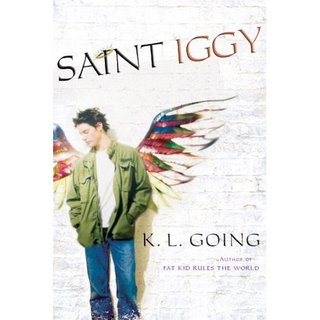Books! Zombies, ponds, and loners!
/An abundance, an embarrassment almost, of good reading lately has succeeded entirely in wiping the rancid aftertaste of Bully Boy from my mind. Naturally, this makes me happy – reading is one of my foremost pleasures, so a bad patch of it can make my entire waking life feel a little wrenched.
After A Tale of Two Summers I read Saint Iggy by K.L. Going, the author of the really good teen fiction book Fat Kid Rules the World. Saint Iggy is cut from much the same cloth – a memorable loner as the main character, and graceful, fun, fluid, intelligent writing throughout. Before I was half-way done with it, I’d forgotten my dissatisfactions with A Tale of Two Summers. Saint Iggy is hugely smarter as a book, and part of what lets it be so is the greater trust it reposes in the kids who’ll be reading it.
I don’t know an open-minded fiction-reading adult who wouldn’t love this book strictly on its own merits. It was just the kind of smart, involving fiction that’s a pleasure to read.
Just as I was finishing up Saint Iggy I struck broadside by an unlooked-for FANTASTIC book, Max Brooks’ World War Z.
The book bills itself as a narrative history of World War Z, in which the nations of the world face annihilation at the hands of … zombies!
Your cheesiness-alarms are going off, I can hear them from here. You’re thinking no novel about zombies can be good in any way, unless in the exclusively silly way done so well by Sci-Fi Channel original movies. And in this case you’d be wrong!
Brooks has done an amazing job here, and he’s taken the best – really the only – tone for the job: complete seriousness. He’s imagined exactly how a plague of zombies would spread, what responses it would evoke from the living world, and what the long-term consequences would be. This book is twice as well thought-out than John Grisham’s last three combined.
If you still don’t believe me, if you’re just close-minded enough to still be repeating to yourself “Oh, I don’t know … zombies … doesn’t sound like my kind of thing,” then try this: try telling yourself that Brooks is just USING zombies as a metaphor for ANY world-wide pandemic – the initial misdiagnoses, the failed containment attempts, the aftermath. OK, so you’re too much of a fiction snob to read a zombie novel – but surely you’re JUST ENOUGH of a fiction snob to read a zombie ALLEGORY, right?
Of course Brooks ISN’T using zombies as a metaphor for anything else – that’s a huge part of what makes this book so damn fun to read. No, this boy’s got zombies on the brain, is fascinated by them, and World War Z only benefits from that. This is really the ultimate zombie novel, just like “Dawn of the Dead” is the ultimate zombie movie.
So cast aside your knee-jerk reactions and give World War Z a try! I myself found reading this zombie-Iliad tremendously enjoyable – I’d be willing to be you will too.
And just as I was finishing World War Z I came across a $2 copy of Alexandra Marshall’s Still Waters, a natural history of America’s freshwater ponds. This book came out in 1978, yet somehow I’d managed to miss it all this time.
Boy, am I glad our paths crossed at last. It’s a slightly oversized hardcover with loads of fascinating black-and-white photos of every aspect of pond-life in all four seasons.
But the main drawing point is Marshall’s writing, which is personal yet informative and always beautifully done. My young friend Elmo and I could tell you how rare this is – even in nature-writing, which tends to bring out the best in many writers, excellent prose isn’t always a given.
Still Waters is out of print, but since it was produced originally to coincide with a Nova special, I’m guessing there’s a healthy number of copies floating around out there. If you’re at all interested in great nature-writing – and especially if you’ve ever fallen in love (as I have) with a particular pond or fen in all its seasons, you’ll be well rewarded by hunting down a copy for yourself.
So there you have it, boom, boom, boom! Three really good books in a row, and my reading equilibrium is restored!
Up next? J.E. Lendon’s book on warfare in classical antiquity, Soldiers & Ghosts. I confess to being a bit leery, since it was history done poorly that derailed my reading in the first place. But the book comes highly recommended by a friend whose opinion I trust (about books anyway … he has deplorable taste in baseball teams), so it will be the meat of my next two hours.
Originally published in Stevereads August 2006



